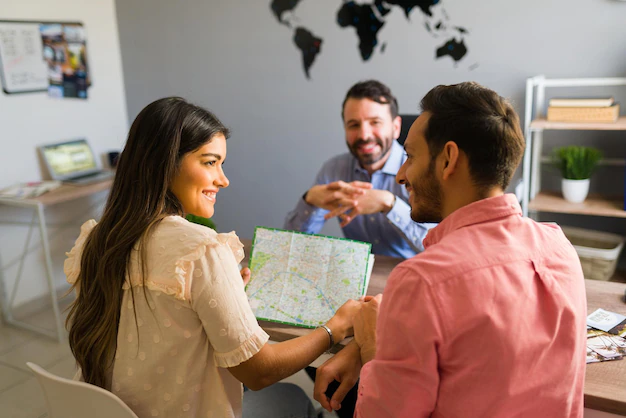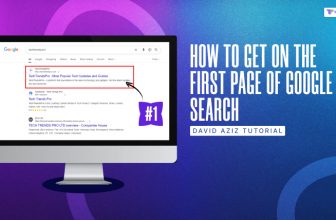
In a world where everything goes online first, the travel industry has evolved by leaps and bounds.
Travel agencies, which used to be accustomed to walk-ins and word of mouth, now need to battle eyeballs in a cluttered digital space.
The key to standing out? Advanced Search Engine Optimization (SEO).
Search Engine Optimization is now not just a buzzword but a necessary investment for SEO services for travel companies to enhance their online presence, entice potential travelers, and develop sustainably.
Whether you are a niche adventure travel consultant or a full-service agency, this comprehensive 2025 guide explores advanced SEO strategies to help you break through Google ranks and turn clicks into bookings.
Why Travel SEO Is More Important Than Ever
Travelers Begin With Google
Research indicates that more than 75% of travelers start planning their trip online, and it all begins with Google searches.
Without effective SEO, your competitors are getting that traffic first before you even join the race.
High-Intent Traffic = High ROI
In contrast to paid advertising, organic search attracts users with high purchase intent—users looking up “luxury Bali honeymoon packages” or “senior European tours with guides” are actively prepared to purchase.
Voice-Driven, Mobile-First Future
Mobile search, voice assistants, and AI-powered algorithms demand conversational, localized, and hyper-relevant content—areas SEO excels at.
Laying A Solid SEO Foundation For Travel Agencies
Have your fundamentals in order before you dive into advanced techniques:
Define Your SEO Targets
- Drive more website traffic
- Increase booking rates
- Rank for long-tail keywords (e.g., “offbeat Morocco travel expert”)
- Increase local visibility
Know Your Personas
Create personas such as:
- Adventure Seeker Amy – Searches for “affordable trekking in Peru”
- Luxury Lover Leo – Searches for “5-star cruise in the Mediterranean”
- Family Planner Farah – Searches for “family-friendly resorts in Thailand”
Tailor your SEO strategy to these personas.
Keyword Research: The Starting Line
A successful SEO for travel agencies requires a thorough understanding of your potential clients and target audience for each stage of a journey.
1. Short-Tail vs Long-Tail Keywords
- Short-tail: “Thailand tour”
- Long-tail: “10-day Thailand island-hopping package for couples”
Use tools such as:
- SEMrush, Ahrefs, Google Keyword Planner
- AnswerThePublic and AlsoAsked for voice search keywords
2. Seasonal & Trend-Based Keywords
Use Google Trends to forecast when users search for:
- “Cherry blossom Japan trips” (Feb–April)
- “Northern lights Iceland packages” (Sept–March)
3. Geo-Targeted Keywords
Include location-based searches
- “New York travel agent for European visa assistance”
- “Personalized Kerala honeymoon from Mumbai”
Pro tip: Monitor competitors’ rank keywords with tools such as Ubersuggest.
On-Page SEO: Every Element Optimized
On-page SEO optimization is very important for travel agency SEO success. Each page of the website needs proper optimization to help it rank and also attract visitors.
1. Title Tags & Meta Descriptions
Write compelling titles with applicable keywords:
- “7-Day Safari Tours in Kenya | Tailor-Made Wildlife Adventures” Keep meta descriptions short under 160 characters and actionable.
2. Header Hierarchy (H1, H2, H3.)
Use formatted headings for readability and improved indexing:
- H1: “Best Luxury Tours in Italy”
- H2: “Why Choose a Private Tour?”
- H3: “Exclusive Hotels and Experiences”
3. Keyword Placement
Insert keywords naturally in:
- Intro and conclusion
- Image alt text
- Content (first 100 words)
- URLs (e.g., /custom-tuscany-wine-tours/)
4. Multimedia Optimization
- Compress images for faster loading
- Add ALT tags with travel keywords
- Use video transcripts to boost SEO
Technical SEO: The Backend That Drives Visibility
Ensuring your Technical SEO goes hand in hand with On-page SEO optimization to ensure the website’s page speed and whether it is optimized for mobile devices as well.
1. Mobile Optimization
- Responsive design, regardless of screen size
- Use Core Web Vitals to measure user experience
2. Site Speed
Slow websites lose traffic. Utilize:
- Google PageSpeed Insights
- Zip files, activate cache, CDN
3. SSL Certificate (HTTPS)
Google prefers secure websites. It also establishes trust with users.
4. XML Sitemap & Robots.txt
Submit sitemaps to Google Search Console to help crawlers index your site.
5. Schema Markup
Implement a schema for travel, such as:
- Tour package details
- Prices and availability
- Reviews and star ratings
It may help you achieve rich results in SERPs.
Content Marketing: The Travel Storytelling Advantage
For all travel agencies and websites, SEO, creating content, and storytelling focused on the destination helps improve both search visibility and user experience.
Producing high-quality and engaging content is very important to attract and retain visitors and readers and convert them into clients.
1. Destination Guides
Examples:
- “Complete Guide to Exploring the Amalfi Coast in 7 Days”
- “Everything You Need to Know About Traveling in Patagonia”
Add:
- Maps
- Travel timelines
- Interactive media
2. User-Generated Content (UGC)
Use:
- Client reviews
- Traveler photos and stories
- Video testimonials
3. Itinerary Blogs
Emphasize curated itineraries for segments:
- Solo travel, seniors, digital nomads, and newlyweds
Utilize a content calendar to publish seasonally appropriate articles.
Off-Page SEO: Building Your Domain Authority
Optimizing your Off-Page SEO is an important part of optimizing your overall website SEO, along with On-Page SEO and Technical SEO. Off-page SEO includes backlinks and managing its online reputation.
1. Backlink Outreach
Obtain links from:
- Travel bloggers
- Local tourism boards
- Destination-specific forums
- Top publications (via HARO or journalist outreach)
2. Influencer Collaborations
Partner with content from travel influencers that includes your website.
3. PR Campaigns & Event Sponsorships
Offer travel expert opinions or sponsor events for obtaining backlinks.
Even if you are internationally based, local SEO helps turn local searches.
Optimize:
- Google Business Profile – Add “Travel Agency” and “Visa Consultant” categories
- NAP Consistency – Ensure name, address, and phone number match on platforms
- Local Reviews – Ask happy customers to review on Google
- Location Pages – Rank terms like “Travel packages from Delhi to Dubai”
Voice Search & AI Optimization
With the help of voice search and AI optimization, we can redefine the way we plan our travels, making it faster, more convenient, and making it highly personalized.
1. Target Questions
Voice searchers naturally speak:
- “Where do I find the best honeymoon packages to Bali?”
- “When do I need to go to Japan to see cherry blossoms?”
Create FAQ sections or well-organized Q&A pages.
2. Featured Snippets
Google pulls content from content in the following coded formats:
- Bullets
- Numbered lists
- Tables
Use these structures to capture position zero.
SEO Tracking & Analytics
Both SEO tracking and Analytics are very important to understand how the website is performing and at the same time identify ways to further improve it and in turn increase business.
Key Tools:
- Google Analytics 4 – Track user behavior, bounce rate, and session duration
- Google Search Console – Index status and page performance audit
- SEMrush/Ahrefs – Rankings, traffic, and backlinks tracker
- Hotjar/Clarity – User behavior on your pages
Metrics To Monitor:
- Organic traffic
- Conversion rate
- Time on page
- Bounce rate
- Target keyword ranking position
Set goals and monitor on a monthly basis to refine your approach.
Case Study: How One Travel Agency Scaled Up
Company: Mystical Journeys India Problem: Ranking low for competitive keywords such as “Spiritual tours to India” Solution:
- Published long-form blogs: “Top 10 Sacred Places to Visit in India”
- Optimized site speed and employed schema for events
- Collaborated with a wellness influencer to create backlinks
Results:
- 230% growth in organic traffic within 6 months
- Bookings increased by 58%
- Positioned #1 for “Spiritual retreat India packages”
Your Journey To SEO Success Starts Now
The digital travel landscape is fiercely competitive, but also full of opportunities. By implementing these advanced SEO strategies, your travel agency can attract more qualified leads, enhance your reputation, and grow organically.
Remember, SEO isn’t a sprint—it’s a long-term investment. But with the right strategies in place, you’ll not only elevate your online visibility, you’ll become the go-to choice for travelers worldwide.
Read Also:






